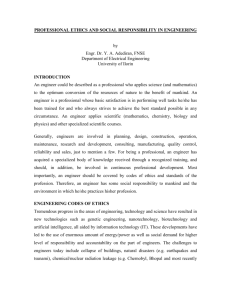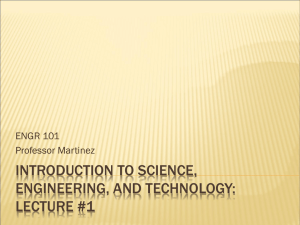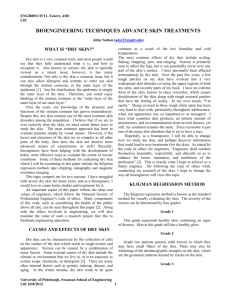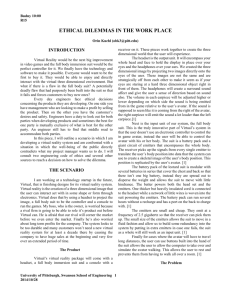Ethics in Engineering
advertisement
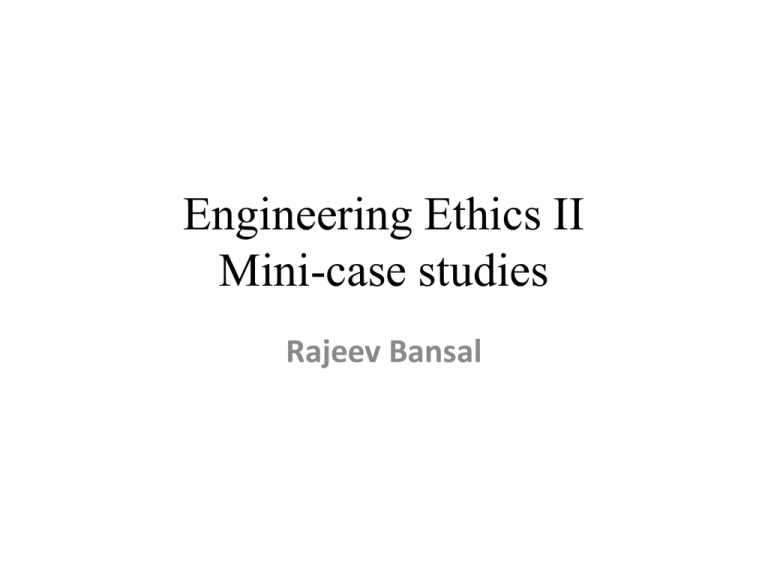
Engineering Ethics II Mini-case studies Rajeev Bansal With respect to the IEEE Code of Ethics for engineers: A. The rules are a bad thing because they encourage engineers to spy on and betray their colleagues. B. The rules are a useful legal defense in court, when engineers can demonstrate that they obeyed the rules. C. The rules enhance the image of the profession and hence its economic benefits to its members. D. The rules are important in providing a summary of what the public has a right to expect from responsible engineers. The IEEE Code of Ethics requires engineers to conform to all but one of the following rules. Which rule is not required? A. Do not charge excessive fees. B. Do not accept bribes. C. Perform services only in the areas of personal competence. D. Avoid conflicts of interest. You are an engineer and a manager at an aerospace company with an important government contract supplying parts for a spacecraft. As an engineer, you know that a projected launch would face unknown risks because the equipment for which you are responsible would operating outside its tested range of behaviors. However, since you are also a manager you know how important it is to your company that the launch be carried out on schedule. Should you: A. Allow your judgment as a manager to override your judgment as an engineer, and so permit the launching. B. Toss a coin to decide, since one’s engineering and managerial roles are equally important, so neither should take precedence over the other and engineers. C. Abstain from voting in any group decision in the matter, since as bother a manager and an engineer one has a conflict of interest in this case. D. Allow your judgment as an engineer to override your judgment as a manager, and do not permit the launching. You are the engineer of record on a building project which is behind schedule and urgently needed by the clients. Your boss wants you to certify some wiring installation as properly completed even though you know some questionable installation techniques were used. Should you: A. Certify it, and negotiate a raise from your boss as your price for doing so. B. Refuse to certify it. C. Tell the clients about the problem, saying to them that you will certify it if they want you to. D. Certify it, but keep a close watch on the project in the future in case any problems develop with it. Assume you are a quality control engineer, supervising the completion of a product whose specification includes using only US-made parts. However, at a very late stage, you notice that one of your subcontractors has supplied you with a part having foreign-made bolts in it – but these aren’t very noticeable and would function identically to USmade bolts. Your customer urgently needs delivery of the finished product. What should you do? A. Say nothing and deliver the product with the foreign bolts included, hoping this fact won’t be noticed by the customer. B. Find (or, if necessary, invent) some roughly equivalent violation of the contract or specifications for which the customer (rather than your company) is responsible – then then tell them you’ll ignore their violation if they ignore your company’s violation. C. Tell the customer about the problem, and let them decide what they wish you to do next. D. Put all your efforts into finding legal loopholes in the original specifications, or in the way they were negotiated, to avoid your company appearing to have violated the specifications. Your company buys large quantities of parts from various suppliers in a very competitive market sector. As a professional engineer you often get to make critical decisions on which supplier should be used for which parts. A new supplier is very eager to get to your company’s business. Not only that, but you find they are very eager to provide you personally with many benefits – free meals at high-class restaurants and free vacation weekends for supposed business meetings and demonstrations, and other more confidential things such as expensive gifts that arrive through the mail, club memberships and so on. What should you do? A. Do not accept any of the gifts that go beyond legitimate business entertaining, even if your company would allow you to accept such gifts. B. Report all gifts, etc., to your company and let them decide whether or not your should accept them. C. Accept the gifts without telling your company, because you know that your professional judgment about the supplier will not be biased by the gifts. D. Tell other potential suppliers about the gifts, and ask them to provide you personally with similar benefits so you won’t be biased in favor of any particular supplier. You have been assigned to work on a proposal to the government. The proposal manager tells you and several other nonexempt workers that he’d like you to stay at home Thursday and Friday and then come in and work Saturday and Sunday but to report that you worked Thursday and Friday. That way, you would work 40 hours for the week, but the company would not have to pay you overtime for the weekend. “After all,” he says, “proposal money is short.” What do you do? Answers offered are: A. Grudgingly comply thinking these days a job is a job. B. Check with Human Resources to see if company policy permits this. C. Call the ethics officer and allege unfair treatment. D. Speak up immediately and question the manager’s right to impose such a condition A coworker is injured on the job. You are a witness and could testify that the company was at fault. What do you do? The answers they provide are: A. Don’t get involved. B. Contact the injured coworker and offer to appear on her behalf. C. Report to the company what you saw to ensure that the safety hazard is corrected. D. Protect the company by refusing to appear as a witness for the injured. For several months now, one of your colleagues has been slacking off, and you are getting stuck doing the work. You think it is unfair. What do you do? The candidate answers are: A. Recognize this as an opportunity for you to demonstrate how capable you are. B. Go to your supervisor and complain about this unfair workload. C. Discuss the problem with your colleague in an attempt to solve the problem without involving others. D. Discuss the problem with the human resources department. You are working on a government contract and are convinced that a serious mischarging incident has occurred. You also believe that it was deliberate since the program was running out of funds. The candidate answers are: A. Call the Department of Defense hot line. B. Inform the local newspaper of your suspicions. C. Discuss it with your local audit office. D. Send an anonymous note to your corporate ethics office. A friend of yours want to transfer to your division but may not be the best qualified for the job you have open. One other person, whom you do not know, has applied. What do you do? The mini-cases were adapted from the material in the following sources: • M. C. Potter (ed.), Fundamentals of Engineering Review, 8th ed., Great Lakes Press, 1999. • Lockheed Martin’s Ethics Game (as presented in Ethics in Engineering Practice and Research by C. Whitbeck, Cambridge, 1998.)
